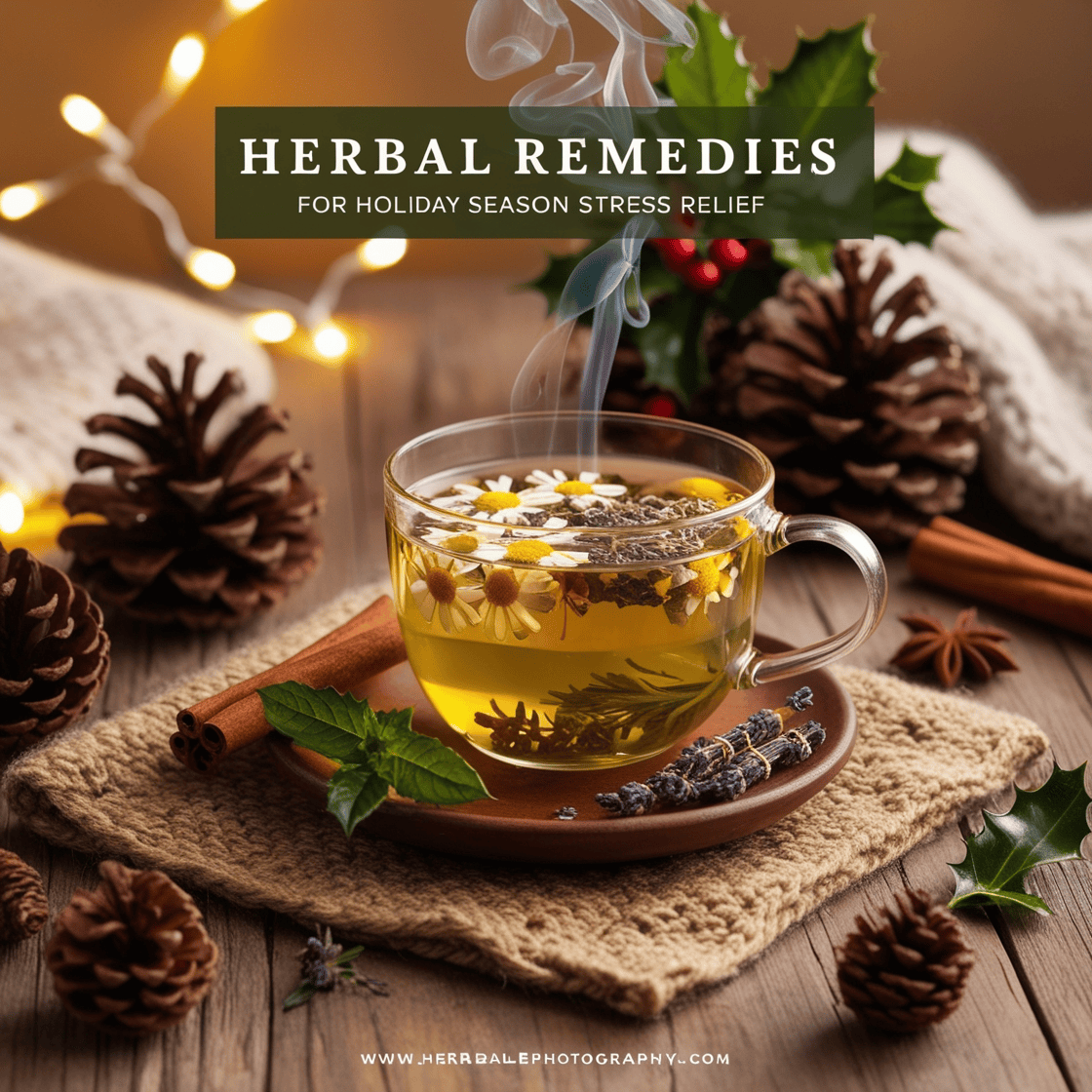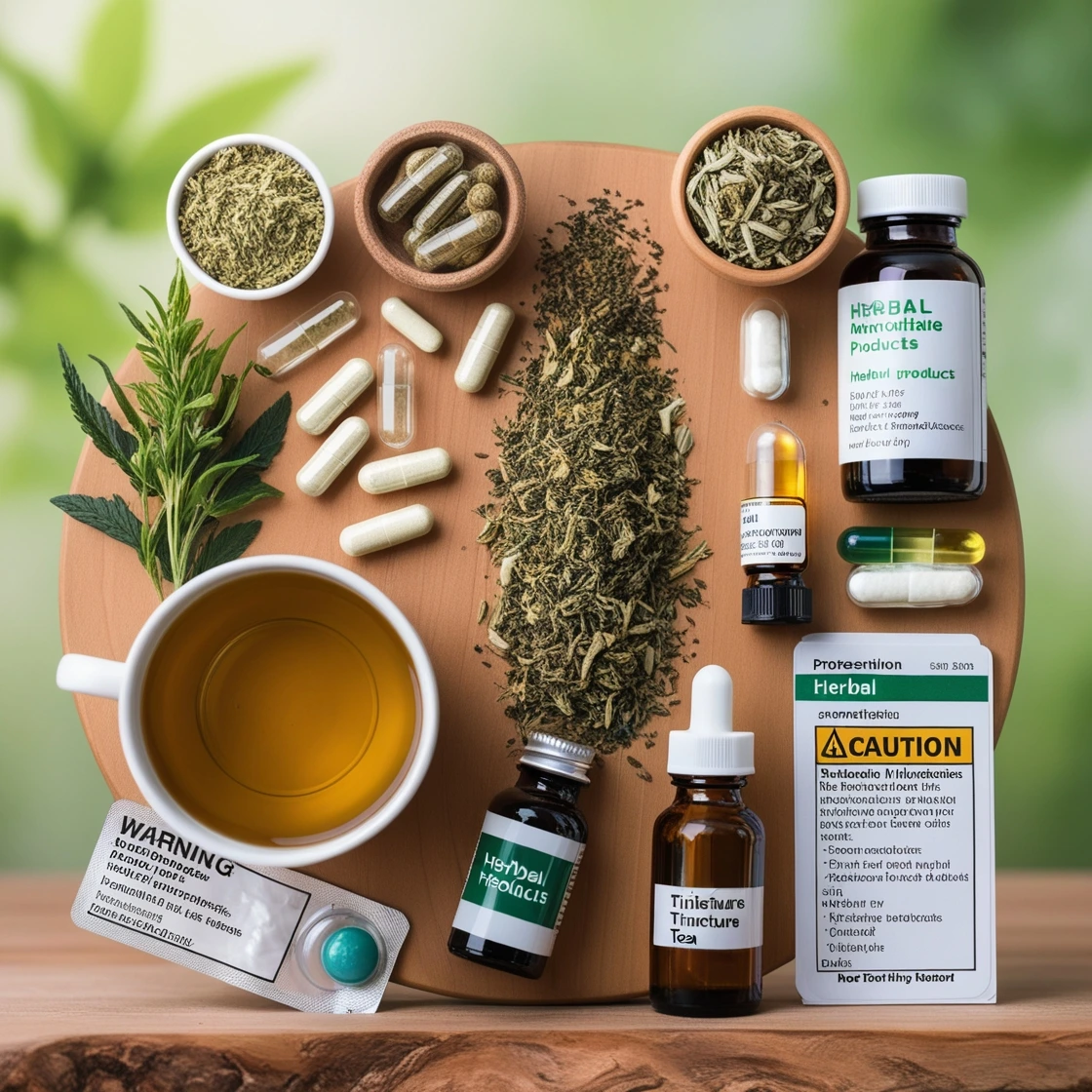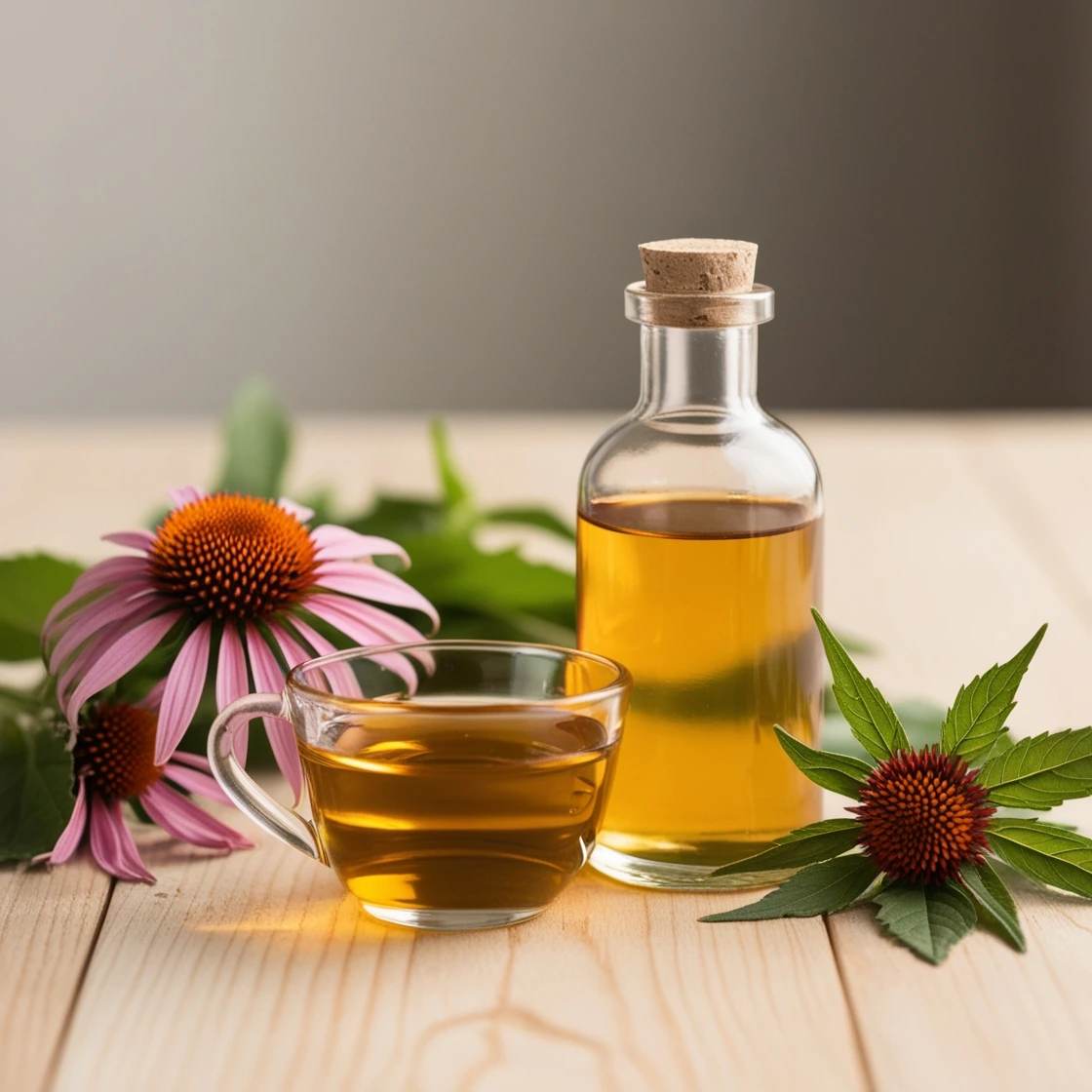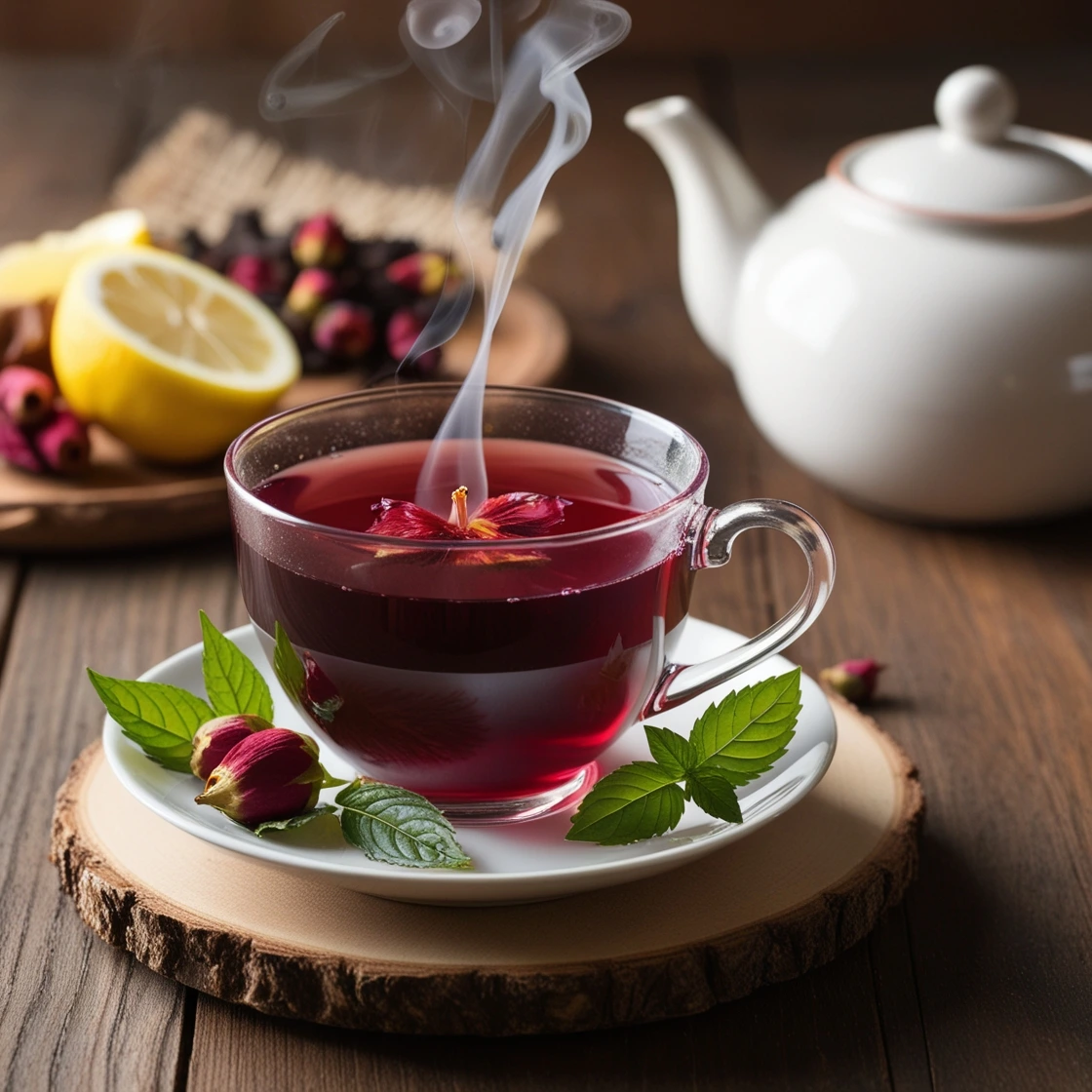Introduction
Are you keen on strengthening your immune system naturally? But are confused about how to do it? Well look no further. Mother Nature has got you covered. Immune boosting herbs will boost your body’s defenses against infections and help them fight off bacteria and viruses. Before explore the topic of herbs for immune support, let us take a brief look at the topics of what is the immune system and how it works to protect the body from pathogens.
The immune system is a complex network of natural barriers that defends the body against harmful viruses, bacteria, and fungi. While conventional medicine treats acute illness, herbs have been used for centuries in traditional medicine to boost the body’s immune resilience naturally.
In this guide we will explore 5 best herbs for immune support. We will also delve into the science of immunity and how to find practical ways to incorporate to incorporate these herbs into your daily life.
How Herbs Enhance Immune Function
The immune system has two primary components. First ,innate immunity, which provides immediate defense, and the second one is adaptive immunity, which learns and adapts to specific pathogens. Herbs enhance immune health through various mechanisms in several ways:
Stimulating White Blood Cells
Many herbs activate macrophages, natural killer cells, and T-lymphocytes to combat infections.
Fighting Free Radicals
Antioxidant-rich herbs neutralize free radicals, which damage immune cells.
Reducing Chronic Inflammation
Long-term inflammation can weaken immunity; herbs with anti-inflammatory properties restore balance.
Improving Gut Health
Since 70% of immune cells reside in the gut, herbs that promote gut health also enhance immunity.
Active compounds
These compounds in medicinal herbs stimulate immune activity and strengthen the body’s defenses.
Antioxidant properties
Antioxidant properties in herbs help neutralize free radicals, supporting overall immune function.
Bioactive components
Herbs like Turmeric (Curcuma longa) and Garlic contain bioactive components that offer antimicrobial and anti-inflammatory benefits.
Research Insight
Research shows that herbs such as elderberry, turmeric, and astragalus have compounds that boost the immune response and provide antiviral effects.
“In conclusion, astragalus root and elderberry fruit extracts increase the IFN-β inducing activity of L. acidophilus in dendritic cells, suggesting that they may exert antiviral and immune-enhancing activity,” states a research paper published in a peer reviewed journal.

Top Herbs for Immune Support
Some of the best herbs for immunity include Elderberry, Garlic (Allium sativum), Astragalus (Huang qi), and Echinacea. These immune-enhancing herbs are renowned for their antiviral properties, antioxidant activity, and ability to support the body’s natural defenses against infections like the influenza virus and respiratory infections.
1. Elderberry (Sambucus nigra)
Elderberry has been widely used as an effective natural remedy for centuries to prevent and manage colds and flu. It is one of the most effective herbs for immune support as it is rich in anthocyanins, flavonoids, and vitamins A and C, which enhance immunity.
Key Benefits
- A. Shortens the duration of respiratory infections by reducing viral replication.
- B. Strengthens mucous membranes, forming a protective barrier against pathogens.
- C. Fights oxidative stress with its rich antioxidant profile.
How to Use
- A. Brew elderberry tea from dried flowers or berries.
- B. Prepare elderberry syrup with honey for daily immune support.
- C. Take elderberry supplements for standardized dosages.
Scientific Validation
According to research elderberry extract is effective in significantly reducing cold duration and symptoms.
“These data suggest a significant reduction of cold duration and severity in air travelers. More research is warranted to confirm this effect and to evaluate elderberry’s physical and mental health benefits,” states the research paper.
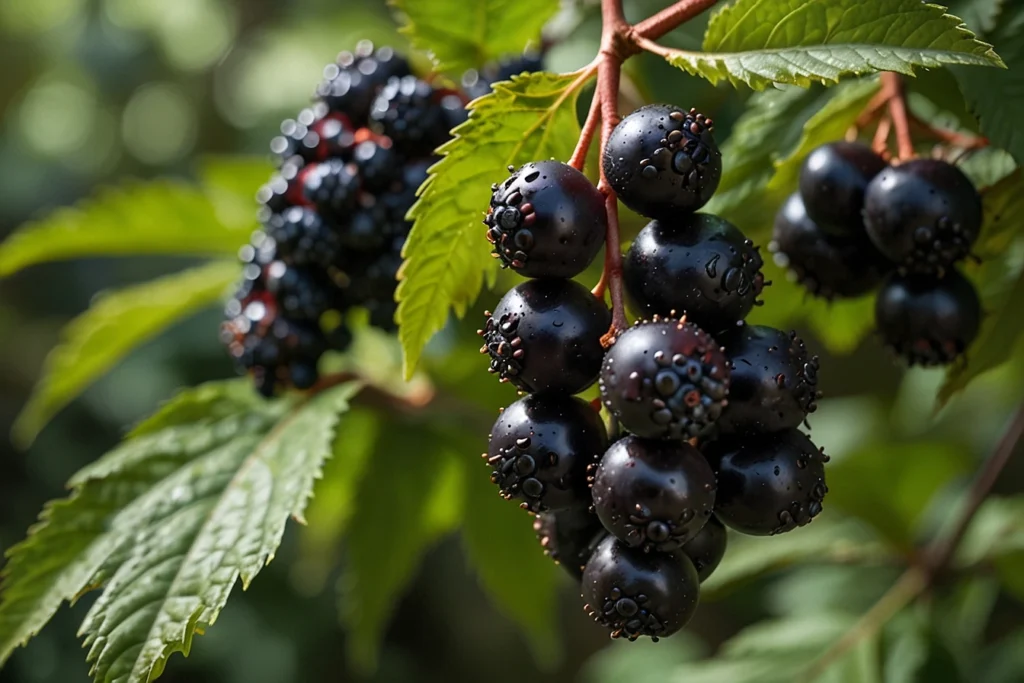
2. Turmeric (Curcuma longa)
Key Benefits
- A. Modulates the activity of T-cells, B-cells, and natural killer cells.
- B. Reduces inflammatory markers, such as interleukin-6 (IL-6).
- C. Enhances gut health, which is vital for a robust immune system.
How to Use
- A. Add turmeric to soups, smoothies, or curries.
- B. Drink golden milk, a mixture of turmeric, milk, and black pepper.
- C. Take curcumin supplements with piperine to increase bioavailability.
Scientific Validation
Research shows that when turmeric is combined with black pepper, it boosts curcumin absorption by up to 2000%.
“Research suggests that curcumin can help in the management of oxidative and inflammatory conditions, metabolic syndrome, arthritis, anxiety, and hyperlipidemia,” states a study titled Curcumin: A Review of Its’ Effects on Human Health.
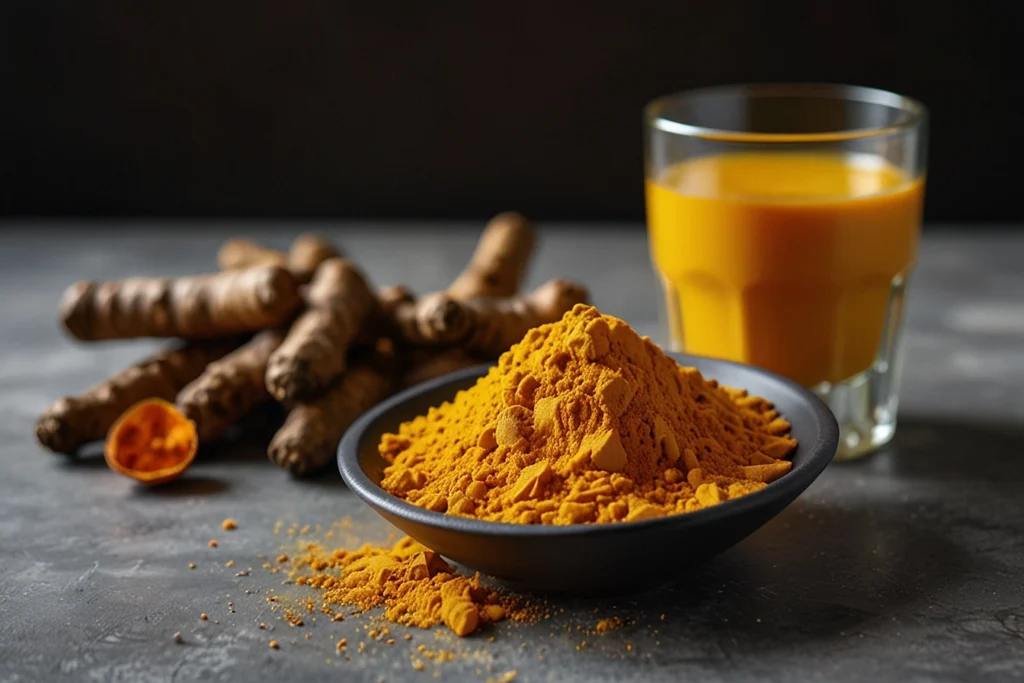
3. Astragalus (Huang Qi)
Astragalus is a widely used herb in traditional Chinese medicine for building build long-term immune resilience and fight chronic infections.
Key Benefits
- A. Enhances macrophage activity and increases the production of interferons.
- B. Reduces level cortisol, a hormone responsible for the body’s response to stress, mitigating stress-induced immune suppression.
- C. Provides polysaccharides that strengthen cellular immunity.
How to Use
- A. Simmer dried astragalus root in soups or teas.
- B. Take capsules containing standardized extracts.
- C. Combine with other immune-boosting herbs for synergistic effects.
Side Effects
According to the National Center for Complimentary and Integrative Health some possible side effects of oral use of this herb include rash, itching, nasal symptoms, or stomach discomfort.
“Little is known about whether it’s safe to use astragalus during pregnancy or while breastfeeding. Some research in animals suggests that astragalus can be toxic to the mother and fetus,” states an article on its official website.
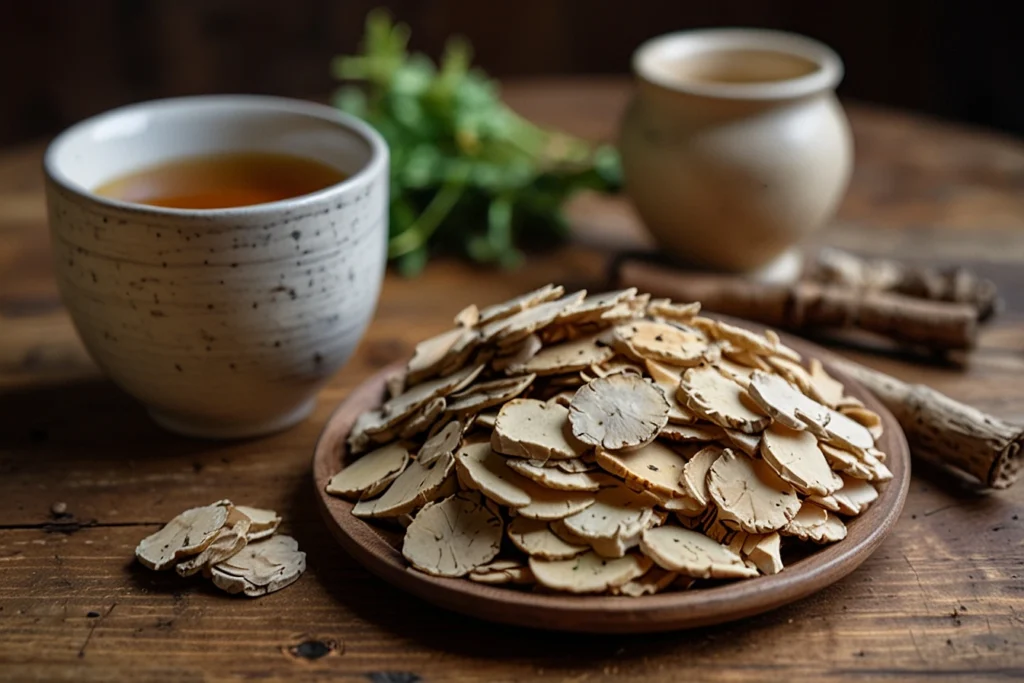
4. Echinacea
Echinacea is a widely used herb for immune health. It is especially effective during cold and flu season. It contains compounds such as contains alkamides, phenolic acids, and polysaccharides that strengthens the body’s immune response against infections.
Key Benefits
- A. Increases the activity of phagocytes, which engulf harmful pathogens.
- B. Stimulates the production of cytokines, essential for immune communication.
- C. Offers mild apoptogenic properties to combat stress.
How to Use
- A. Prepare echinacea tea using dried flowers and roots.
- B. Use tinctures at the onset of cold symptoms.
- C. Take supplements during peak cold and flu seasons.
Scientific Validation
Research shows that regular consumption of echinacea under expert supervision reduces the likelihood of catching a cold by 58%. It also significantly decreases recovery time.
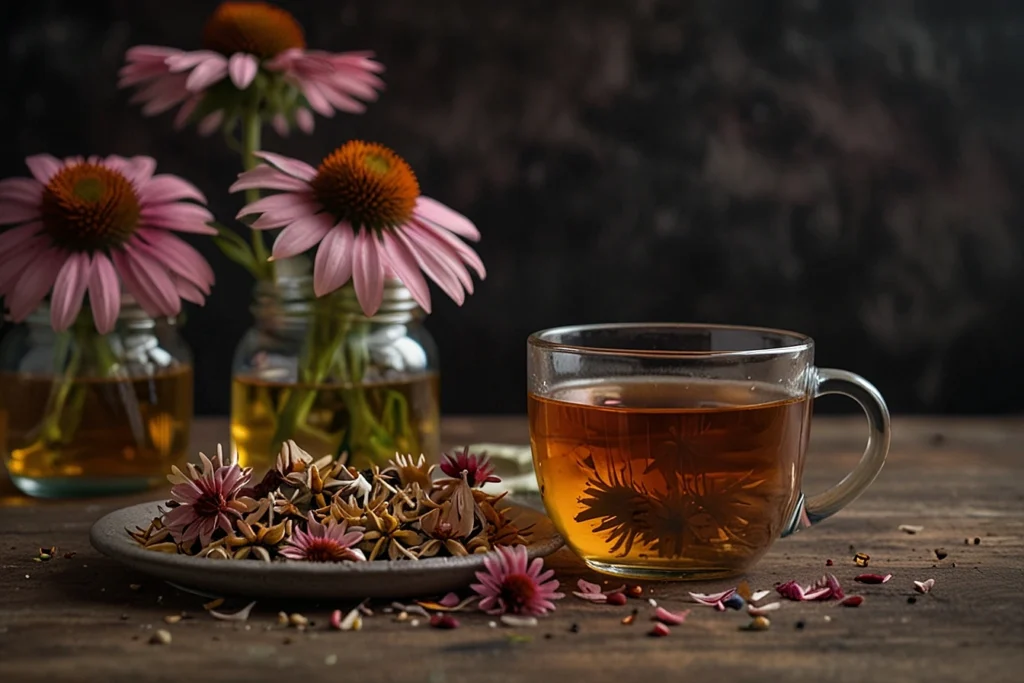
5. Ginger (Zingiber officinale)
Ginger due to its antimicrobial, and anti-inflammatory properties has become a staple for immune health. Research shows that its especially effective for respiratory symptoms.
Key Benefits
- A. Inhibits the growth of respiratory viruses.
- B. Relieves sore throat, congestion, and nausea.
- C. Improves circulation, ensuring efficient delivery of immune cells.
How to Use
- A. Brew fresh ginger tea with honey and lemon.
- B. Use grated ginger in soups and stir-fries.
- C. Combine with turmeric for enhanced immune support.
Scientific Validation
A study on the anti-oxidative and anti-inflammatory effects of ginger published in PubMed Central says that ginger can treat a wide range of diseases via immunonutrition and anti-inflammatory responses.
“Likewise, the anticancer potential of ginger is well documented and its functional ingredients like gingerols, shogaol, and paradols are the valuable ingredients which can prevent various cancers, angiogenesis and metastasis, induction of apoptosis, and inhibition of cell-cycle progression. Besides these, it improves cardiovascular disorders, diabetes mellitus, and gastrointestinal health,” says the study.
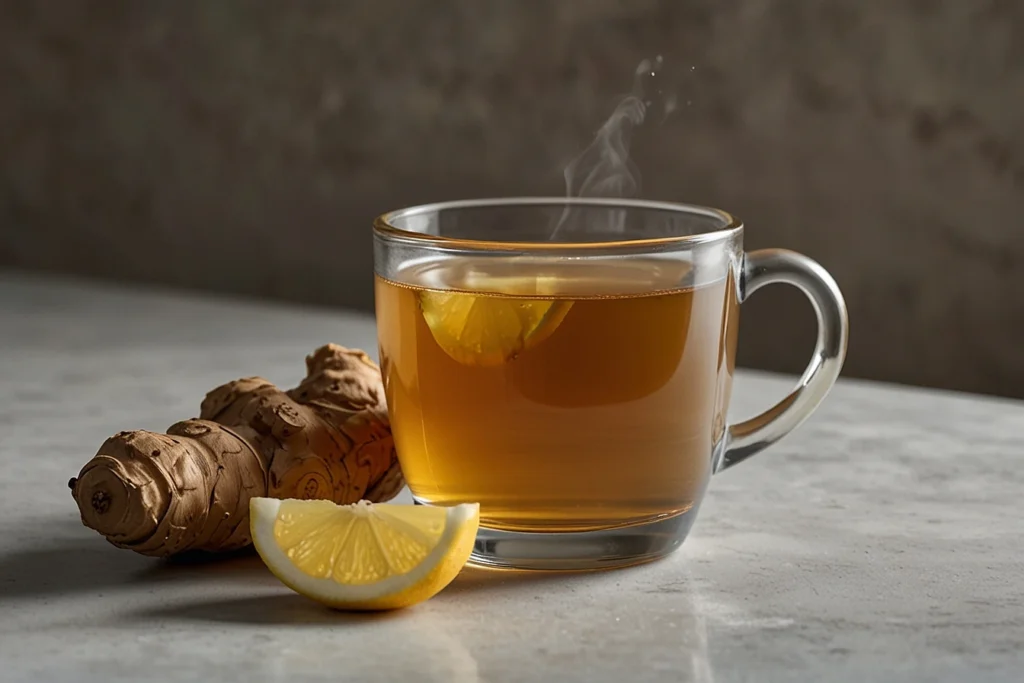
Recipes for Immune-Boosting Herbal Remedies
1. Elderberry Syrup
Ingredients
- A.1 cup dried elderberries
- B .4 cups water
- C.1 cup raw honey
Instructions
- Simmer elderberries in water for 45 minutes.
- Strain the liquid, let it cool, and mix with honey.
- Take 1–2 tablespoons daily for immune support.
2. Golden Milk
Ingredients
- A. 1 cup milk (dairy or plant-based)
- B. 1/2 tsp turmeric powder
- C. A pinch of black pepper
- D. 1/4 tsp cinnamon
Instructions
- A. Heat the milk and whisk in the spices.
- B. Sweeten with honey if desired.
- C. Drink warm to enhance sleep and immunity.

Lifestyle Tips to Complement Herbal Remedies
Herbs work best alongside healthy lifestyle practices.
- A. Sleep Well: Poor sleep reduces immune function. Aim for 7–9 hours nightly.
- B. Stay Active: Moderate exercise enhances circulation and immune efficiency.
- C. Hydration: Proper hydration supports lymphatic function. Drink at least 2 liters daily.
- D. Stress Management: Chronic stress suppresses immunity. Practice yoga, meditation, or deep breathing exercises.
Pro Tip
Combining adaptogenic herbs like ashwagandha with these practices helps manage stress-induced immune suppression.

Can herbs prevent viral infections?
A. Although no herbs can guarantee complete prevention, some herbs are effective in providing natural defenses against viruses.
- B. Black Elderberry has shown effectiveness against influenza and other viruses like the respiratory syncytial virus.
- C. Echinacea may reduce the duration of colds and sore throats when used at the early stages of infection.
- D. Garlic supplements are widely used for their antiviral activity, especially in combating viral infections.
Are there any side effects of using immune-boosting herbs?
Although herbs are generally considered to be safe when taken as part of a balanced diet, there can be side effects:
- A. Garlic supplements can thin the blood, so individuals taking blood thinners should avoid it.
- B. Elderberry supplements should be taken in moderation to avoid digestive discomfort.
- C. Some herbs, such as medicinal mushrooms like Grifola frondosa, may trigger mushroom allergies in sensitive individuals.
D. Consult a healthcare provider before using herbs, especially if you have underlying conditions or take medications.

What is the role of adaptogenic herbs in immune support?
Adaptogenic herbs like Ashwagandha and Rhodiola strengthens the body’s ability to adapt to stress. This indirectly supports immune function. Chronic stress can weaken your immune system, and these herbs help regulate cortisol levels (a hormone responsible for the body’s response to stress) promoting overall immune health and optimal health.
How can I include immune-supporting herbs in my daily routine?
- A. Try using herbal immune tonics, such as elderberry syrup or immune-boosting teas like ginger tea, echinacea tea or turmeric tea.
- B. Add culinary herbs like garlic and turmeric to your meals for both flavour and health benefits.
- C. Take herbal dietary supplements or single herb extracts like astragalus for targeted support.
- D. Explore DIY options, such as preparing tinctures, teas, or incorporating herbs into herb gardening practices.
Are there herbal remedies for specific immune-related conditions?
Certain herbs are effective for specific concerns.
Echinacea
It is commonly used for sore throats and colds.
Turmeric
This herb Beneficial for managing inflammation and supporting the digestive tract.
Garlic
It helps combat the influenza virus and supports cardiovascular and immune health.
Can herbal remedies replace traditional medicine for immune support?
Herbs are a valuable addition to maintaining health but should not replace traditional medicine for serious conditions. They complement medical treatments by boosting the immune system, reducing inflammation, and providing antiviral properties. Always consult a healthcare professional before replacing prescribed medications with herbal medicine.
What are some herbal teas for immune support?
Here is list of immune-boosting teas that you can include in your daily routine.
Elderberry tea
It is rich in antioxidants and great for immune defenses.
Ginger and turmeric tea
These two herbs combine antioxidant and anti-inflammatory properties.
Astragalus root tea
It is a foundational herb in Traditional Chinese Medicine for enhancing immunity.
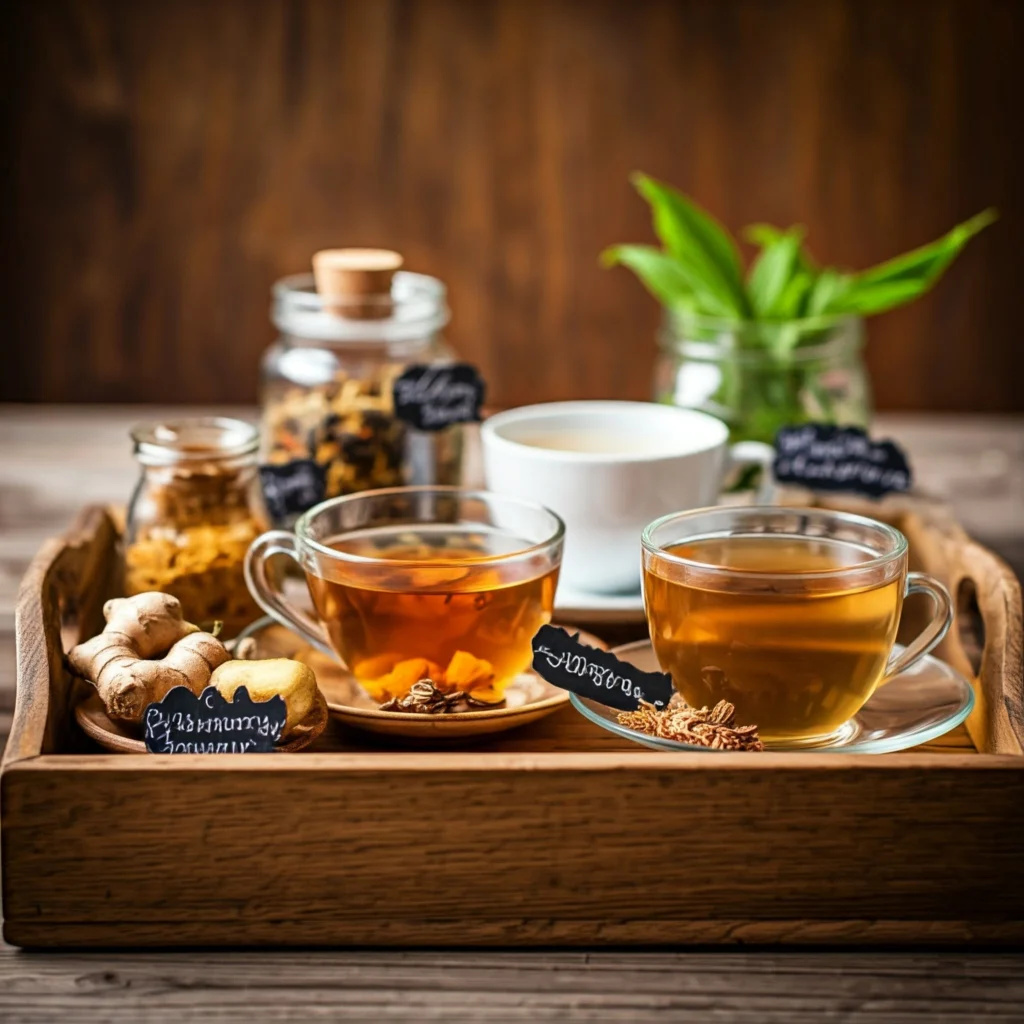
Are there herbs suitable for children’s immune health?
Some herbs like Elderberry and Chamomile are considered safe for children when used appropriately. For example, elderberry syrup is often used as a gentle herbal immune booster. However, always consult a pediatrician before giving herbal remedies to children.
How can I grow herbs for immune support at home?
You can start with herb gardening by planting herbs like garlic, echinacea, and lemon balm. These herbs can grow in most climates and can be cultivated organically for fresh, immune-boosting teas or culinary use.
Which herbs are commonly used in Traditional Chinese Medicine for immunity?
In Traditional Chinese Medicine, herbs like Astragalus (Huang qi) and Schisandra are widely used to enhance immune health and support the body’s natural defenses. They are often combined with other medicinal plants for comprehensive support.
How do medicinal mushrooms support the immune system?
Medicinal mushrooms, such as Reishi, Maitake (Grifola frondosa), and Shiitake, contain bioactive compounds that stimulate immune activity. They are often used in herbal tonics and supplements to enhance overall immunity.
Can herbs interact with medications?
Some herbs can interact with medications. Garlic supplements may affect individuals on blood pressure or blood thinner medications. Elderberry supplements may not be suitable for people with autoimmune conditions. Always consult a healthcare provider to ensure safety when combining herbs with prescribed drugs.
Are there any studies supporting the benefits of immune-boosting herbs?
There are several studies that highlight the effectiveness of herbs for immune support. Research published in the American Journal of Clinical Nutrition highlights the health benefits of antioxidant-rich herbs like elderberries and garlic.
Studies in journals like the Journal of Food Science and Journal of Agricultural and Food Chemistry explore the bioactive compounds and medicinal properties of herbs for enhancing immunity.
How does vitamin intake complement herbal remedies for immunity?
Vitamins like Vitamin C, Vitamin D, and Vitamin E work synergistically with herbs to promote immune health. Elderberry syrup is rich in Vitamin C, which supports the respiratory tract. Vitamin D supplements can help maintain healthy functions, especially when combined with herbs like garlic and turmeric.
What are some good resources to learn more about immune-boosting herbs?
You can explore resources like the Chestnut School of Herbal Medicine, which provides detailed plant profiles and tips on using medicinal wayside plants. Additionally, reading blogs or journals like Everyday Health can offer further insights.
Conclusion
Herbs offer a natural, effective way to support your immune system and achieve optimal health. Barring a few, these benefits mostly come without any adverse side effects, even more so if taken under the supervision of a healthcare provider.
From adaptogenic herbs like astragalus to antimicrobial herbs like garlic, these immune boosting herbs have been widely used for centuries. Incorporate them into your daily routine through herbal tonics, teas, or supplements to enjoy their immune boosting benefits. So which herb for immune support suits you the best? Tell us in the comments section.
FAQ: Herbs for Immune Support
1. What are the top herbs for immune support?
Some of the top herbs for immune support include Elderberry, Echinacea, Astragalus, Garlic, and Turmeric. These herbs have been widely recognized for their ability to enhance immune function and help protect the body against infections. While Elderberry is especially well-known for its antiviral properties, Garlic is a powerful antimicrobial herb. Echinacea and Astragalus are highly effective for strengthening the immune system, and Turmeric supports immune health through its anti-inflammatory effects.
2. Can herbs help to strengthen the immune system?
Yes, certain immune-strengthening herbs are proven to support the body’s natural defenses. Herbs like Elderberry, Garlic, and Echinacea contain potent compounds that enhance immune system activity. These herbs can help increase the body’s ability to ward off viruses, bacteria, and other pathogens. Herbal immune boosters can be especially useful in maintaining immune health and fighting off infections.
3. How do herbs improve immune function?
Herbs for immune support work by stimulating various aspects of the body’s immune system. Many herbs contain bioactive compounds that trigger the production and activity of immune cells, like white blood cells. For example, Garlic contains allicin, a compound known for its antimicrobial and antiviral properties. Turmeric, with its active ingredient curcumin, is an excellent anti-inflammatory herb that also boosts the body’s natural defenses. These herbs help the body recognize and fight infections more effectively.
4. Are there natural solutions to build a stronger immune system?‘
Indeed, there are several natural remedies to build immune strength. Herbal medicine offers a range of options, such as drinking herbal teas made from Echinacea, Ginger, or Turmeric to promote overall immune function. Supplements like Elderberry syrup or Astragalus extract also provide added support for immune health, strengthening your body’s ability to fight off illnesses, especially during cold and flu season.
5. Do immune-boosting herbs have any side effects?
While herbs to support the immune system are generally safe, it is always recommended to consult a healthcare provider before starting any new herbal regimen. Some herbs, such as Garlic, may interact with medications like blood thinners, while others could cause allergic reactions in sensitive individuals. Always follow recommended dosages, and if you’re pregnant or on other medications, seek professional advice.
6. How can I incorporate immune-boosting herbs into my diet?
Incorporating immune-boosting herbs into your routine is simple. You can use them as dietary supplements or prepare them in herbal teas. For instance, you can add fresh Garlic to your meals for a daily immune boost, or consume Elderberry syrup to help ward off infections. Additionally, Echinacea and Astragalus are available in capsule or tincture forms, making them easy to incorporate into your daily supplement routine.
7. Can herbs help prevent viral infections like the flu?
While herbs for boosting the immune system are not a cure for viral infections like the flu, they can support the body’s natural defenses and reduce the severity of symptoms. Elderberry, Echinacea, and Garlic are particularly beneficial when taken early in the onset of flu symptoms. They may help shorten the duration of the illness and support faster recovery.

